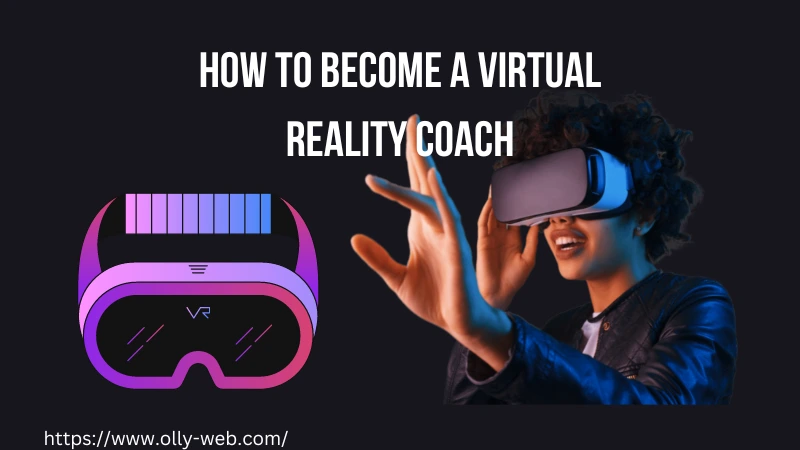How to Become a Virtual Reality Coach – (Best Guide 2024)

Whether you want to become a virtual reality coach for fun or a career, there are many different ways to get started. In this article, we will explore some of the critical factors necessary to becoming a virtual reality coach and how you can achieve your goal of becoming one.
What is virtual reality coaching?
Virtual reality coaching is a cutting-edge approach to personal development and coaching that utilizes immersive technology to create realistic and interactive simulations. These simulations allow individuals to practice and improve their skills in a safe and controlled environment.
To become a virtual reality coach, you will need to have a strong background in coaching or counselling, as well as experience working with virtual reality technology.
The field of virtual reality coaching is expanding. It offers qualified advice and assistance to those looking to enter the VR market. People can get help from VR coaches to create, advertise, and sell their VR content. They also offer guidance on how to profit from virtual reality evangelism and demos.
People who wish to enter the VR sector but want to spend less money on equipment may find VR coaching a fantastic option. You may learn the tricks of the trade from VR coaches to successfully produce and market VR content. Additionally, they can assist you in figuring out how to profit from your virtual reality task.
How to Become a Virtual Reality Coach
- Choose a niche
- Purchase the right equipment and software
- Get a Mentor
- Get Certified
- Create your own space
- Develop Your Coaching Style
- Market Yourself
Virtual reality coaching is an emerging field that offers a unique way to connect with clients and provide personalized support and guidance. If you are interested in becoming a virtual reality coach, here are some steps you can take to start your journey:
- Choose a niche: Before diving into virtual reality coaching, it's important to identify your niche or area of expertise. Whether you specialize in career coaching, mental health coaching, fitness coaching, or any other area, having a niche will help you stand out and attract clients who are looking for your specific expertise.
- Purchase the right equipment and software: To become a virtual reality coach, you will need to invest in the necessary equipment and software. This includes a virtual reality headset, controllers, sensors, and VR-compatible software that will allow you to create immersive experiences for your clients. Make sure to do your research and choose equipment that is compatible with the type of coaching you plan to offer.
- Get a Mentor: Finding a mentor who has experience in virtual reality coaching can be incredibly beneficial as you start your journey. They can provide guidance, support, and valuable insights that will help you navigate the industry and build your skills.
- Get Certified: While certification is not always required to become a virtual reality coach, obtaining relevant certifications can help you stand out in the field and demonstrate your expertise to potential clients. Look for certification programs that focus on virtual reality technology, coaching techniques, and ethics.
- Create your own space: To effectively coach clients in virtual reality, you will need a dedicated space where you can set up your equipment and conduct sessions.
Once you have chosen your niche, invested in the necessary equipment and software, found a mentor, and obtained relevant certifications, the next step is to create your own space for virtual reality coaching. This dedicated space should be free from distractions and provide a comfortable environment for both you and your clients.
Consider setting up a designated area in your home or office where you can set up your virtual reality equipment. Make sure the space is well-lit, quiet, and free from distractions. You may also want to consider adding elements that enhance the virtual reality experience, such as comfortable seating, ambient lighting, and calming decor.
- Develop your coaching style: Virtual reality coaching offers a unique opportunity to create immersive experiences for your clients. Take the time to develop your coaching style and determine how you can best utilize virtual reality technology to help your clients achieve their goals. Experiment with different techniques and approaches to find what works best for you and your clients.
- Market your services: Once you have everything in place, it's time to start marketing your virtual reality coaching services. Create a professional website or social media profiles to showcase your expertise and attract potential clients. Consider offering free consultations or introductory sessions to entice new clients, and reach out to your network or industry organizations to spread the word about your services.
Becoming a virtual reality coach can be a rewarding and fulfilling career path for those who are passionate about helping others achieve their goals. By following these steps and putting in the time and effort to develop your skills, you can start on the path to becoming a successful virtual reality coach.
Take the time to hone your niche, invest in the right equipment, find a mentor, get certified, create a dedicated coaching space, develop your coaching style, and market your services effectively. With dedication and determination, you can build a successful virtual reality coaching business and make a positive impact on the lives of your clients.
Cost of becoming a virtual reality coach
Creating a VR learning experience can be costly. For instance, you'll need to invest in a VR headset and some 3D assets, like a virtual environment and virtual objects. These technologies will give you an immersive experience unmatched by any other technology.
You'll also need to acquire the right equipment and software. Most VR headsets cost around $750 to $1,400, and you'll want to make sure they work correctly. This might require you to pay a setup fee of $150 to $200 per headset, and you may need to buy more if you're training multiple people.
You'll also need to acquire the proper training and certification. Becoming a virtual reality coach will depend on the type of training you want to provide—a standard virtual reality training course costs between $4,000 and $60,000. Alternatively, you may decide to work with a vendor who will help you find a better deal.
Invest in VR coaching tools, like a VR headset management system. These products can be expensive, but they'll help you keep track of your headsets, so you can focus on providing adequate training.
The virtual reality coaching industry is growing, and you can find a mentor or training course to help you get started. You'll also need a suitable skill set, including excellent communication and organizational skills. A college degree is important, and you need experience working with people. Finally, you'll need the money to support yourself for a while. If you can do it, the cost of becoming a VR coach may be worth the investment.
In the future, VR is expected to revolutionize communication and work. Analysts say it could be as big a billion-dollar market as the internet. While you'll need to be prepared for the costs, becoming a VR coach can be an exciting career choice. You'll be able to help people learn and have fun at the same time. Just make sure you follow the right steps!
Requirements for becoming a virtual reality coach
Virtual reality technology for coaching is a great way to engage clients and provide them with an immersive learning experience. The technology allows clients to practice real-life situations, such as public speaking, in a safe environment. It also offers a cost-effective alternative to real crowd practice.
Virtual reality coaching is a fun and rewarding career. It can be done online or in person. In order to become a coach, you must be highly skilled in communication and have a strong understanding of virtual reality technology. You also need to have excellent interpersonal skills.
To become a virtual reality coach, you will need a college degree and experience in the coaching field. You may also need to have additional certifications. Depending on the level of certification, it can cost anywhere from $5,000 to $30,000. You will also need to have software and equipment. You may also need to take workshops to further your education.
To become a virtual reality coach, you will need to learn the basics of virtual reality technology and have a broad understanding of virtual reality applications in different fields. You will need to design a program for your clients and implement it. You will also need to create an online presence and network with other coaches to promote your business.
You will need to develop effective communication skills, have a thorough understanding of virtual reality technology, and be able to provide engaging programs for your clients. You may also need to be familiar with different VR headsets. You will also need to understand the software that goes along with the headset.
The benefits of using virtual reality for coaching include practicing real-life situations and receiving feedback. It can help improve performance, reduce stress, and increase user engagement. It also provides businesses with a competitive edge.
Virtual reality coaching can also help improve athletic performance, as it provides an exciting and immersive learning experience. You can use personalized VR coaching sessions to correct mistakes as a coach. You will be able to identify players' eye movements during plays.
Currently gaining popularity is a new medium called virtual reality (VR). A growing number of people are using it for gaming and other forms of leisure since it enables you to explore many worlds or alternative realities. VR is much more than just a game platform, though. In reality, it has the potential to be utilized for a wide range of other things, like training and teaching. You should be aware of a few things if you wish to work as a virtual reality coach.

The Various VR Coaching Methods
The use of virtual reality coaching to assist people in reaching their objectives has grown recently. Three basic categories of VR coaching exist hybrid, online, and face-to-face. The most popular type of virtual reality tutoring is conducted online. One-on-one coaching sessions using virtual reality headsets are a part of this sort of VR coaching.
Online VR coaching is losing popularity to face-to-face VR tutoring. In-person meetings and VR headsets are required for this kind of VR coaching. A brand-new form of virtual reality (VR) coaching that mixes online and in-person components is called blended VR/online VR coaching. This enables trainers to offer their consumers specialized guidance while utilizing the appropriate technologies for each circumstance.
Positives Side of Virtual Reality Coaching
- Improves User Retention: Since using apps or playing games in virtual reality can be more exciting, users may spend more time doing so.
- Virtual reality (VR) has the potential to improve education by providing students with a more engaging learning environment that is both interactive and immersive.
- Users who engage in VR training can implement previously learned skills or new information more effectively.
- Numerous people believe virtual reality coaching reduces stress levels more than conventional coaching or video training.
Common challenges of being a virtual reality coach
Taking your coaching a step further than a one-on-one session is challenging. Creating a connection is a task in and of itself, and the virtual environment is no different. Many coaches are already using the Lego Serious Play toolbox. While at it, you'll want to make sure you're leveraging the best of your surroundings.
It's common for the camera to be turned off for part of the session. While the camera may not be the center of attention, a well-designed virtual environment can make a mighty difference in a coach's psyche. A clear and concise message is the best way to ensure that your team members are as invested in the session as you are.
The best part about an exemplary virtual environment is that it can be utilized to enhance your players' development. It can also be used to help with rehabilitation and solving isolated incidents. Using VR technology to enhance the immune system is an effective way to combat stress. Many coaches are using technology to help players conquer fears.
There's no shortage of virtual training tools on the market, so it's up to you to determine which will best suit your needs. While the benefits of VR may be obvious to those who are well-versed in the technology, it's still best to keep an open mind. This is an excellent time to ask questions about your team's needs before you begin your coaching sessions.
Consider what your team has to offer before diving in. In the end, you'll be in a much better position to tackle the challenges that come your way. Using the right tools can make the difference between a successful and a failed training session.
The best way to know is to test out the technology with your team, preferably before you launch your training program. If you decide to give it a whirl, here are five tips you can follow to ensure you're doing all you can to make your training sessions as effective as possible.
Using virtual reality in coaching the tactical side of the game
Virtual reality is a growing trend in coaching the game's tactical side. It helps athletes to train their motor imagery and to manage their physiological stress. Aside from that, it provides informative feedback and guidance for athletes. The technology also eliminates the risk of injury in physical training.
Several researchers have studied the effectiveness of using virtual reality in soccer training. The first step in this analysis is to capture the player's movements in a soccer game. This will allow for comparing the players' actions in a virtual simulation and real situations. The second step is to develop an animation, and the third is to present the virtual environment to the athletes.
Another study on the effectiveness of using virtual reality in soccer training showed that the participants who opted to use the VR system had a shorter hesitation time. The statistical difference between the groups was due to high intra-group variability.
Using virtual reality in coaching the tactical side of soccer is similar to training players in real life, as it may seem. A VR system can design multiple formations and organize them in advance of the match. This system also allows for special training sessions, such as training against a chosen opponent.
Soccer is one of the leading ball sports in which virtual reality technology is being used. Several training programs are being developed to educate soccer players about tactics and assess their performance. The VR Ambush Trainer provides a first-person view of the ground and allows the players to map their weapons and the fields of fire on which they'll be expected to strike. The VR system can also assess soldiers' readiness for combat and detect improvised explosive devices.
Soccer is one of the most popular sports in the world. With the sport‘s growing popularity, it is becoming increasingly important for teams to improve their coordination. Virtual reality in soccer training can enhance the players' strategic imagery while also helping them manage their physiological stress.
FAQs on Becoming a Virtual Reality Coach
How do I become a virtual coach?
Becoming a virtual reality coach can be an exciting and rewarding career path for those interested in helping others improve their skills, overcome challenges, and achieve their goals. Virtual reality coaching allows you to work with clients from anywhere in the world, using cutting-edge technology to create immersive and engaging coaching experiences.
To become a virtual reality coach, follow these steps:
1. Develop your coaching skills: Start by honing your coaching skills through training, workshops, or certification programs. It's important to have a strong foundation in coaching techniques and methodologies.
2. Learn about virtual reality: Familiarize yourself with virtual reality technology and how it can be used in coaching. Understand the different platforms, software, and applications available for creating virtual coaching experiences.
3. Gain experience: Look for opportunities to gain experience in virtual reality coaching, whether it's through internships, volunteer work, or working with clients on a freelance basis. Practice creating virtual coaching sessions and getting feedback from clients.
4. Build your network: Connect with other virtual reality professionals, coaches, and potential clients to expand your network and build relationships. Attend industry events, workshops, and conferences to stay updated on the latest trends and developments in virtual reality coaching.
5. Create a portfolio: Showcase your virtual reality coaching work by creating a portfolio that highlights your skills, experience, and success stories with clients. This can help you attract potential clients and demonstrate your expertise in the field.
6. Market yourself: Use online platforms, social media, and networking events to market yourself as a virtual reality coach. Share content related to virtual reality coaching, such as articles, videos, and case studies, to demonstrate your knowledge and expertise. Consider creating a website or online profile to showcase your services and attract potential clients.
7. Stay updated: Keep up with the latest trends and developments in virtual reality technology and coaching techniques. Continuously seek opportunities for professional development and training to enhance your skills and stay competitive in the field.
How do I get a career in VR?
In today's digital age, virtual reality (VR) technology is becoming increasingly popular across various industries, from gaming to healthcare to education. As a result, the demand for skilled VR professionals, including VR coaches, is on the rise. If you are interested in pursuing a career as a virtual reality coach, here are some steps you can take to get started:
1. Gain relevant skills and knowledge:
To pursue a career in virtual reality coaching, it is essential to gain relevant skills and knowledge in the field. Start by familiarizing yourself with virtual reality technology and understanding how it is used in coaching. Take courses, workshops, or certification programs to develop your expertise in VR coaching techniques and methodologies. Additionally, gaining hands-on experience through internships or volunteer work can help you apply your skills in real-world scenarios and build a strong foundation in VR coaching.
2. Network with industry professionals:
Networking with industry professionals, including other virtual reality coaches, can help you learn more about the field and connect with potential opportunities. Attend industry events, workshops, and conferences to meet professionals in the VR coaching space and build relationships that can lead to job opportunities or collaborations.
3. Build a portfolio:
Create a portfolio showcasing your VR coaching work, including virtual coaching sessions you have created, client success stories, and any projects or collaborations you have been involved in. A strong portfolio can help demonstrate your skills and experience to potential employers or clients.
4. Market yourself effectively:
Use online platforms, social media, and networking events to market yourself as a virtual reality coach. Share content related to VR coaching, such as articles, videos, and case studies, to showcase your expertise in the field. Consider creating a website or online profile to promote your services and attract potential clients.
5. Stay updated on industry trends:
Virtual reality technology is constantly evolving, so it is important to stay updated on the latest trends and developments in the field. Continuously seek opportunities for professional development and training to enhance your skills and knowledge in VR coaching and stay competitive in the industry.
6. Seek out job opportunities:
Once you have gained the necessary skills, built a strong portfolio, and established your online presence, start seeking out job opportunities in virtual reality coaching. Look for positions at VR companies, coaching organizations, educational institutions, or technology firms that incorporate VR into their training programs. Consider reaching out to potential clients or organizations directly to offer your services as a virtual reality coach.
7. Stay persistent and adaptable:
Building a career in virtual reality coaching may take time and effort, so it is important to stay persistent and adaptable in your approach. Be open to new opportunities, collaborations, and challenges that come your way, and be willing to continuously learn and grow in the field. By staying dedicated and flexible, you can position yourself for success as a virtual reality coach and make a meaningful impact in the growing field of VR coaching.
What is a VR coach?
A virtual reality (VR) coach is a professional who utilizes virtual reality technology to provide coaching and guidance in various areas such as sports, fitness, mental health, education, and personal development. They work with individuals or groups to help them improve their skills, overcome challenges, and achieve their goals.
A VR coach creates immersive experiences using VR headsets and software that simulate real-world situations and scenarios. This allows clients to practice and receive feedback in a safe and controlled environment, leading to more effective learning and development. VR coaches may use a combination of virtual simulations, interactive exercises, and personalized feedback to support their clients in reaching their desired outcomes.
VR coaching can be used in a wide range of industries and settings, including sports training, corporate leadership development, therapy and counseling, education and training, and more . By leveraging the power of VR technology, coaches can provide innovative and engaging coaching experiences that enhance learning, performance, and personal growth.
Can you make money online coaching?
Yes, you can make money online coaching in the virtual reality space. With the increasing popularity of virtual reality technology, there is a growing demand for coaches who can help individuals navigate and excel in this immersive environment.
To become a virtual reality coach, you will need to have a strong understanding of virtual reality technology and how it can be used for coaching purposes. You should also have experience in coaching or mentoring individuals in your chosen field, as well as excellent communication and interpersonal skills.
To monetize your virtual reality coaching services online, you can offer one-on-one coaching sessions, group workshops or classes, online courses or webinars, and personalized virtual reality experiences for clients. You can also partner with VR companies or organizations to provide coaching services for their customers or employees.
Can I make money in VR?
Yes, you can definitely make money as a virtual reality (VR) coach. As the demand for VR technology continues to grow, there is an increasing need for skilled professionals who can help individuals and businesses navigate this new digital landscape.
To become a VR coach, you will need to have a strong understanding of VR technology and its applications. This may involve taking courses or workshops on VR development, programming, or design, as well as gaining experience in coaching or mentoring in your chosen field.
Once you have the necessary skills and experience, you can start offering your services as a VR coach to clients in various industries such as sports, fitness, education, mental health, and more. You can create personalized virtual reality experiences for individuals or groups, provide coaching sessions using VR simulations, and develop online courses or workshops to reach a wider audience.
There are several ways to monetize your VR coaching services, such as charging hourly rates for one-on-one coaching sessions, selling subscriptions to online courses or workshops, partnering with VR companies for collaborative projects, or offering corporate training programs. By leveraging your expertise in virtual reality technology and coaching skills, you can create a lucrative career as a VR coach and make a positive impact on your clients' lives.
Which course is best for VR?
If you are interested in becoming a virtual reality coach, it is important to have a strong foundation in the technology and applications of VR. One of the best courses for learning about VR is the Virtual Reality Specialization offered by Coursera in partnership with the University of London.
This specialization covers all aspects of virtual reality, including the history and evolution of VR, creating immersive experiences, programming for VR, designing VR applications, and more. The courses are taught by experts in the field and provide hands-on experience with VR technology.
Other popular courses for learning about VR include:
– Udacity's Virtual Reality Nanodegree Program: This program covers topics such as 3D graphics, virtual reality design principles, user interaction, and more. It is designed for individuals looking to build a career in VR development .
– Unity's XR Development with Oculus: This course teaches students how to create VR experiences using the Unity engine and Oculus hardware. It covers topics such as spatial audio, hand tracking, and optimizing performance for VR applications.
– Stanford University's Virtual Reality Certificate Program: This program provides an in-depth exploration of VR technology, including creating virtual environments, designing interactive experiences, and understanding the psychological effects of VR on users. It is suitable for individuals interested in the psychology and user experience aspects of virtual reality.
Can you get paid in VR?
Yes, you can get paid as a virtual reality (VR) coach. As the demand for VR experiences and coaching continues to grow, there are opportunities for individuals to make a living by offering their services in this field.
To become a VR coach, you will first need to have expertise in a particular area that people would seek coaching for. This could include fitness, meditation, mindfulness, sports training, education, mental health, or any other field where VR can be used as a tool for coaching and improvement.
Once you have the necessary skills and experience, you can start offering your services to clients. You can charge hourly rates for one-on-one coaching sessions, sell subscriptions to online courses or workshops, partner with VR companies for collaborative projects, or offer corporate training programs.
Can anyone become an online coach?
Becoming a virtual reality coach can be an exciting and rewarding career path for those who have a passion for helping others achieve their goals. But many people wonder if anyone can become an online coach. The answer is yes, anyone can become a virtual reality coach with the right mindset, skills, and dedication.
One of the key requirements to becoming a successful virtual reality coach is having expertise in a specific area that people would seek coaching for. This could be anything from fitness and sports training to mental health and education. It is important to have a deep understanding of your chosen field and how virtual reality technology can be used as a tool for coaching and improvement.
In addition to expertise in your chosen area, it is also important to have strong coaching skills.
What qualifications do you need to be a coach?
To become a virtual reality coach, you will need a combination of technical skills, coaching experience, and a deep understanding of virtual reality technology. Here are some qualifications that can help you succeed in this field:
1. Technical expertise: As a virtual reality coach, you should have a strong understanding of virtual reality technology and be comfortable working with VR hardware and software. This includes knowing how to set up VR equipment, troubleshoot technical issues, and create immersive VR experiences for your clients.
2. Coaching experience: Having experience as a coach or mentor in your chosen field is essential for becoming a successful VR coach. You should be able to motivate, inspire, and guide your clients towards their goals using virtual reality technology as a tool.
3. Education and training: Consider completing courses or programs specifically focused on virtual reality coaching, such as the ones mentioned earlier in this article. These can provide you with the knowledge and skills needed to excel in this field.
4. Certification: While not always required, obtaining a certification in virtual reality coaching can help boost your credibility and attract more clients. Look for programs or organizations that offer certifications specifically for VR coaching.
Can you be a virtual life coach?
Yes, becoming a virtual reality coach is definitely possible and can be a rewarding career choice for those interested in using technology to help others achieve their goals and improve their lives. Virtual reality coaching allows individuals to connect with clients in a more immersive and interactive way, providing a unique and engaging experience that traditional coaching methods may not be able to offer.
How does virtual coaching work?
Essentially, it involves the use of virtual reality headsets or devices that allow both the coach and the client to interact in a virtual environment. This can include virtual meetings, training sessions, simulations, and more. Coaches can use VR technology to create personalized coaching experiences for their clients, such as virtual reality scenarios that mimic real-life situations or challenges.
Virtual coaching also allows for real-time feedback and guidance, as coaches can observe their clients' actions and responses in the virtual environment.
Do Life Coaches make money?
Yes, life coaches can make a good income if they have the right skills, experience, and marketing strategies in place. The amount of money a life coach can earn varies depending on several factors such as their level of expertise, reputation in the industry, niche focus, and the client base they serve.
Virtual reality coaching is a relatively new and innovative approach to coaching that utilizes virtual reality technology to create immersive coaching experiences for clients. As a virtual reality coach, you have the opportunity to work with clients from all over the world and provide them with unique and engaging coaching sessions that can help them achieve their goals.
How much does a virtual life coach cost?
The cost of working with a virtual reality life coach can vary depending on several factors, including the coach's level of experience, expertise , and the services they offer. On average, virtual reality life coaches can charge anywhere from $50 to $200 or more per session. Some coaches may also offer package deals or monthly subscriptions for ongoing coaching support.
How do I become a virtual coach?
To become a virtual coach, one may consider obtaining a certification in a related field such as life coaching, business coaching, or technology and then gaining experience in working with clients virtually. Additionally, gaining experience and knowledge in virtual reality technology and its applications can also be beneficial.
What degree do you need to be a virtual reality designer?
A degree in a field such as computer science, game design, or multimedia design may be beneficial for becoming a virtual reality designer. However, many VR designers come from a variety of different backgrounds and have self-taught themselves the necessary skills through online resources and courses.
What does Virtual Coaching mean?
Virtual coaching refers to the use of technology, such as video conferencing or virtual reality, to provide coaching services remotely.
Is VR training effective?
Studies have shown that VR training can be effective in certain industries, such as healthcare and the military, for tasks such as surgical simulations and virtual battle simulations. However, more research is needed to fully understand its effectiveness in other areas.
What are 3 disadvantages to VR training?
Three disadvantages to VR training include the cost of equipment and software, the potential for motion sickness, and the limited availability of VR content for certain industries.
What is needed for VR training?
To participate in VR training, one would need a VR headset and a computer or gaming system with sufficient processing power to run the VR software.
Why has VR failed?
VR has failed to fully take off in some areas such as consumer entertainment, as the technology has not yet reached a point where it can fully deliver on its potential for immersive gaming and other experiences. Additionally, the cost of VR equipment has also been a barrier for some consumers.
What is VR not good for?
VR may not be suitable for certain tasks such as tasks that require fine motor skills or tasks that require real-world interactions.
Is VR the future of education?
The potential for VR in education is still being explored and studied, but it has shown promise in areas such as language learning and cultural immersion.
How long does it take to learn VR development?
The amount of time it takes to learn VR development can vary greatly depending on one's prior experience and the specific skills they wish to learn. However, many online resources and courses are available to help individuals learn VR development in a relatively short amount of time.
How much does it cost to create a virtual reality experience?
The cost of creating a virtual reality experience can vary greatly depending on the complexity of the experience and the tools and software used to create it.
What companies use virtual reality training?
Companies in various industries, such as healthcare, military, and retail, have used virtual reality training for tasks such as surgical simulations, virtual battle simulations, and employee training.
How do I start a virtual coaching business?
To start a virtual coaching business, one may consider obtaining relevant certifications or qualifications, building a website and social media presence, and networking with potential clients.
Do online coaches make money?
Yes, online coaches can make money by providing virtual coaching services to clients over the internet. This can include one-on-one coaching sessions, group coaching, or coaching through online coursework.
What are the 3 levels of coaching?
There are different ways to categorize the levels of coaching, but one common framework is:
Level 1: Awareness, which includes understanding one's own personality and behavior, as well as identifying areas for improvement.
Level 2: Skill Building, which includes developing specific skills, such as communication or time management.
Level 3: Performance, which includes achieving specific goals and making measurable improvements in one's life or career.
How many hours should you play VR a day?
It is recommended to not use VR for more than 30 minutes at a time, as prolonged use can cause eye strain, headaches and nausea. You should also take regular breaks, every 20-30 minutes, to rest your eyes.
Can VR rewire your brain?
VR technology has the potential to change how the brain processes information, as it can simulate experiences that are similar to real-life experiences. Studies have shown that VR can be used to enhance certain cognitive skills and treat certain medical conditions, but more research is needed to understand the full extent of its effects on the brain.
Is VR development in demand?
The demand for VR development is on the rise as VR technology becomes more advanced and more industries adopt it. In particular, industries such as healthcare, education, and entertainment are starting to use VR to provide new services and improve existing ones.
How do I start a career in VR?
One way to start a career in VR is to gain experience and knowledge in the field through education and training. Pursuing a degree or certification in virtual reality or a related field, such as computer science, game design, or 3D animation, can provide a strong foundation of knowledge and skills needed to work in the industry. Additionally, gaining hands-on experience through internships, projects, or personal projects can also be beneficial. Networking with professionals in the industry and staying up to date with current developments in VR technology can also help to open doors to job opportunities.
How to get a job in the VR world?
To get a job in the VR world, you will need to have the right skills and experience. Pursuing education and training in virtual reality or a related field can provide the foundation you need to understand the technology and develop the skills required to work in the industry. Networking with professionals in the industry and staying up-to-date with current developments in VR technology can also help to open doors to job opportunities. Gaining hands-on experience through internships, projects, or personal projects can also be beneficial. Job search websites and social media groups for VR professionals are a great resource for finding job openings in the industry.
Can you make money in virtual reality?
Yes, you can make money in virtual reality. The VR industry is growing rapidly and there are a variety of job opportunities available in fields such as VR development, design, and consulting. According to Glassdoor, the average salary for VR professionals is around $90,000 per year. Additionally, self-employed VR coaches and consultants can also earn money through providing virtual reality training and coaching services.
Can I coach without a qualification?
While having a coaching qualification is not always a requirement for becoming a coach, it can be beneficial. It can demonstrate to clients that you have the knowledge and skills needed to provide effective coaching services. Additionally, some organizations and companies may require coaching certifications for certain positions. However, it is possible to become a coach without a formal qualification by building a reputation as an expert in your field through experience and demonstrating your coaching skills.
What is the minimum qualification to become a coach?
The minimum qualifications to become a coach can vary depending on the type of coaching and the industry you wish to work in. Some organizations and companies may require coaching certifications for certain positions, while others may not have specific requirements. In some cases, having relevant experience and knowledge in a specific field can be sufficient. Additionally, some coach training programs may have their own specific requirements.
How do I become a coach with no experience?
One way to become a coach with no experience is to start by gaining knowledge and experience in a specific field or industry. This can be done by pursuing education, training, and gaining hands-on experience through internships, projects, or personal projects. Additionally, volunteering or working as an assistant coach can provide an opportunity to gain experience and skills. Building a reputation as an expert in your field through sharing your knowledge and experience can also help to establish yourself as a coach.






